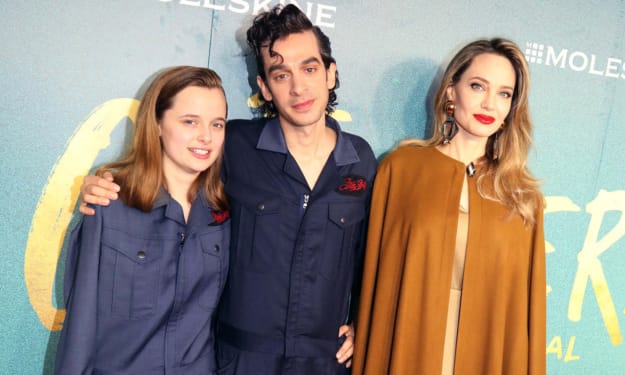Film Review: 'Bit'
The most appetizing aspect of this vampiric feminist revenge horror is its subversive take on the genre.

Life in Oregon hasn't been easy for transgender 18-year-old Laurel (Nicole Maines). So now, freshly graduated from high school, Laurel heads to Los Angeles to stay with her brother Mark (James Paxton) while she figures out what she wants to do with her life. While Laurel came to the city looking for something new, she never expected her new journey would lead to her becoming involved in the supernatural. But that's exactly what happens when Laurel catches the interest of Duke (Diana Hopper), the leader of a queer vampiress gang.
After being bitten by one of Duke's followers, Laurel is given an offer to join the gang by Duke, claiming membership will allow her agency and control in a male-dominated world. But between the idea of having to kill to survive and Duke's aggressive attitude and rules, Laurel isn't sure this is the new life she was looking for. But will she live long enough to find out?
Within its opening minutes, Bit establishes itself as a different sort of horror-comedy. While its story is relatively dark and brooding, there's an irreverent atmosphere to it and a few overt moments of comedy sprinkled in. Even the bizarre disco interlude used for Duke's otherwise somber retelling of her origin story (the most inexplicable moment of the film) has an unlikely charm about it. "Has an unlikely charm about it" is a good way to describe Bit as a whole. While there are moments when the story seems to be going down a messy path, it ultimately avoids most of the unfortunate implications connected to the subgenre and emerges as a refreshingly written and acted vampire drama.
Starting with the story, let's talk about how Laurel makes for a consistently compelling protagonist. Regarding trans representation, Laurel fires on all cylinders. In addition to being played by trans actress Nicole Maines in her first feature-length film, Laurel's transgender status doesn't become her character's defining trait and she's depicted as a rounded, realistically flawed person. She has her rougher moments: one of the first things Laurel does upon arriving in L.A. is violently shove a guy for accidentally bumping into her. But for the most part, Maines plays Laurel as a girl whose snarky front is a cover for a sensitive center; the latter of which Laurel lets show as she's inadvertently pulled into Duke's gang and has to adapt to her new predicament. It's Maines' performance that keeps Laurel sympathetic and likable, as the script keeps her character's motivations annoyingly vague. Even knowing about Laurel's traumatic past, her change in willingness to join Duke and her murderous cohorts is still a hard segue to buy into.
It becomes easier to accept as the movie presses on and we get to see the holes in Duke's supposed "female empowerment" philosophy. As played by Diana Hopper, Duke makes for a fascinating antagonist: as ruthless and cold as she is moderately sympathetic. Her misandristic worldview is quickly introduced to us, as well as the brutal way in which she keeps her underlings in line. But after hearing Duke's backstory (which parallels Laurel's in more ways than one), it's easy to see how her beliefs came to be. The fact that she's open about the fact that her killing spree isn't exclusive to abusive men is another point in her favor. Hopper captures Duke's complex personality well, smoothly alternating between making you loathe Duke and making you empathize with her.
WARNING: SPOILERS BELOW
The climax is where Duke and Hopper are at their best and where Brad Michael Elmore's script shines brightest as a subversive spin on the feminist revenge movie genre. Throughout the movie, Duke lets her malicious colors come out at various intervals. She allows us to see that for all her talk of male corruption and female solidarity, Duke is little better than the repulsive vampire who once manipulated and abused her. As the climax reveals, Duke had no intention of letting Laurel live if she'd refused to join her and had been using mind control (or "glamouring") on her allies, similar to how Vlad brainwashed her into being his sex slave. As unrepentantly evil as Vlad is and as awkwardly histrionic as his dialogue and Greg Hill's performance are, it doesn't take away from the enjoyment of seeing Vlad expose Duke for stooping to his level. Like with Duke's other foes, Elmore clearly writes Vlad and Duke as being equal in their cruelty, with the film ending with both of them vanquished and Laurel leading the remaining vampires in rejecting Duke's misandry and working towards true gender unity.
(I also appreciate how Duke's fate doesn't go down either of the two problematic paths I feared the climax was heading towards. At first, it seemed like Elmore would unfairly paint Duke as being worse than psychic rapist Vlad and have her punished by being forced back into her abuser's servitude. Then, it looked like he'd go the opposite direction in giving Duke a free pass for all her villainy. Thankfully, we're instead given the happy medium of Laurel imprisoning Duke for her crimes--the same punishment Duke had been using against followers who dared to defy her rules)
Spoilers Over
While the rest of Duke's vampire posse doesn't get as much screentime, all of their actors give performances just as natural as Maines and Hopper. Zolee Griggs makes the most impact as Izzy, the most developed of Duke's henchwomen and the one who grows the closest to Laurel as the film goes on. James Paxton brings a lovable big brother energy to Mark, though his fiercest acting comes during SPOILER ALERT Mark's admittedly icky third-act rant to Laurel. While he's right to be angry at Laurel for ignoring her friends and family in favor of vampire vigilantism, his attitude regarding his sister's past doesn't speak highly of him. Mark might be OK with having a trans sibling, but his dismissing Laurel's mental health crisis as "drama" and making it all about himself doesn't reflect well on him. Not helping is how Mark's outburst is never mentioned again, getting the same abrupt droppage treatment as the "vampire hunters" subplot that disappeared after the second act. Spoilers Over
Compared to the last socially conscious vampire flick I've seen, Bit definitely has a lot more going for it. The story is much more engaging and plays more with its unique supernatural premise than Suicide by Sunlight did. By subverting many of the plot elements expected of a typical Girl Power revenge film, Bit is able to make a statement about gender equality and toxic feminism without demonizing either men or women. Even Duke, the most toxic female character of the movie, is written and performed with a healthy amount of nuance. Elmore's script loses its momentum and strength in places, but never for long enough to suck too much life out of the action. And with a great cast to carry its well-crafted messages, Bit is a thirst-quenching watch if you're craving a bloodier brand of female empowerment.
Score: 8 out of 10 hogtied mannequins.
About the Creator
Trevor Wells
Aspiring writer and film lover: Lifetime, Hallmark, indie, and anything else that strikes my interest. He/him.
Twitter: @TrevorWells98
Instagram: @trevorwells_16
Email: [email protected]






Comments
There are no comments for this story
Be the first to respond and start the conversation.